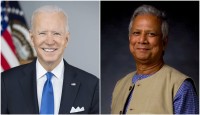"Dawn of America's golden age, depends on a plan for a Neo Colonization using Biblical words: Trump, a Dark World Power?" During an extensive and provocative presentation for reporters at Mar-a-Lago on Tuesday, former President Donald Trump proposed what he referred to as the "dawn of America's golden age." This ambitious vision includes a series of radical ideas that touch upon U.S. territorial expansion and alliances that have sparked significant debate. One of Trump’s key proposals is the acquisition of Greenland from Denmark, which he framed as a national security imperative. In his remarks, he stated, “They ought to relinquish it because we require it for national security. This is for the free world. I'm speaking about safeguarding the free world.” This echoes his previous interest in Greenland, highlighted during his first presidency when he allegedly contemplated a trade that would see Greenland exchanged for Puerto Rico. His fixation on this territory suggests that it is more than a fleeting thought; rather, it is a theme he has consistently revisited. Another controversial point Trump raised was the regaining of control over the Panama Canal, which the United States originally constructed and operated until it was transferred to Panama in 1999. 4 He remarked, “We handed the Panama Canal over to Panama.
In his remarks, he stated, “They ought to relinquish it because we require it for national security. This is for the free world. I'm speaking about safeguarding the free world.” This echoes his previous interest in Greenland, highlighted during his first presidency when he allegedly contemplated a trade that would see Greenland exchanged for Puerto Rico. His fixation on this territory suggests that it is more than a fleeting thought; rather, it is a theme he has consistently revisited. Another controversial point Trump raised was the regaining of control over the Panama Canal, which the United States originally constructed and operated until it was transferred to Panama in 1999. 4 He remarked, “We handed the Panama Canal over to Panama.
We didn’t transfer it to China, which has misused it.” His implication is clear: Trump wishes to reclaim strategic assets that he believes were carelessly relinquished, painting this move as necessary for American interests. Additionally, he suggested transforming Canada into the 51st state, citing the nation's reliance on U.S. military support and substantial economic subsidies. He stated, “Canada receives subsidies amounting to approximately $200 billion annually, in addition to other support. Furthermore, they essentially lack a military. They have a very limited military. We – they depend on our military.” Furthermore, he floated the idea of promoting hockey legend Wayne Gretzky as a gubernatorial candidate, illustrating his penchant for intertwining popular culture with political strategy. In a further demonstration of his vision, Trump proposed renaming the Gulf of Mexico to the Gulf of America, claiming, “It encompasses a substantial area.
The Gulf of America, what a lovely name.” This suggestion highlights his desire to redefine geographic identities in a way that emphasizes American dominance. While it remains uncertain whether Trump genuinely intends to pursue these proposals or views them as a platform for his political rhetoric, his persistent focus on Greenland, Panama, and Canada signals that they are not mere whims but part of a larger narrative he seeks to promote. CNN correspondent Steve Contorno explored Trump's earlier comments regarding these topics, noting that the former president's musings on expansion clash with his repeated calls for tighter border control with Mexico, creating a complex picture of his policy aspirations.
Additionally, Trump's so-called "2.0 strategy" seems to advocate for establishing Canada as a "vessel state," which is characterized by some level of autonomy over domestic affairs while being dominated in foreign relations by another state. This portrayal raises concerns over neo-colonialism, as Trump's economic strategies may be perceived as attempts to reshape global identities and perceptions of sovereignty. The rise of social media adds to this complexity, as Trump’s statements regarding Canada as the "51st state" blur the lines of national sovereignty and highlight external influences that undermine Canadian independence. This kind of rhetoric poses significant challenges to Canada's autonomy and national identity, compelling Canada to respond with decisive and intentional actions. A robust diplomatic protest is essential to address the implications of Trump’s assertions and to reinforce Canada’s status as a distinct and sovereign nation. Canadians value peace and stability, making it crucial for their government to prioritize meaningful dialogues that seek diplomatic solutions rather than escalating tensions.
Ultimately, promoting mutual understanding and respect between nations should be the shared goal, firmly rejecting notions of subjugation and advocating for a future that upholds the sovereignty and dignity of all involved countries. In a related development, Donald Trump Jr. made a visit to Greenland, which his father has previously expressed interest in acquiring, despite the island's firm stance that it is not for sale. During his visit, Trump Jr. described the trip as “a little bit of fun,” highlighting his enjoyment of the outdoors. However, this journey has ignited speculation about his father’s intentions regarding the Arctic territory. Reiterating his father’s claims, Trump Jr. shared sentiments about the necessity of Greenland for American security, a notion echoed by the president-elect during a recent press conference. When pressed about the potential for using "military or economic coercion" to acquire either Greenland or Panama, Trump responded cryptically, “No, I can’t promise you on either of those two, but I can assure you that we need them for economic security.”
This statement underscores his belief that possessing Greenland is essential for U.S. security and economic interests, especially considering the territory’s wealth of natural resources, including rare earth metals, which may become increasingly accessible due to climate change. As the president-elect prepares to take office on January 20, his ambitions regarding Greenland have already stirred controversy across the Atlantic. Despite Denmark’s steadfast assertion that Greenland is not for sale, Trump has continued to press the issue, even mentioning the possibility of imposing tariffs on Denmark.
The potential implications of this icy disagreement raise numerous questions about the future of U.S.-Danish relations, the nature of international territory acquisition, and the geopolitical landscape in the Arctic as Trump’s team outlines their strategic focus on Greenland's valuable mineral reserves and its potential for development. This interest is further complicated by increased Russian activity in the area and China’s declared goal of becoming a dominant player there. Viewing the strategic acquisition of Greenland as a primary option for expanding US territory in North America should be seen as a means to secure his legacy. Trump's 2.0 policy and the new year 2025 Loss Angels Wildfires and earthquake in Tibet and the Himalayas indicate that the dark side of world power in the name of the Biblical world has not yet been revealed. True God is nature, and it can overturn any power on this earth. Pamelia Riviere Freelance writer and Analyst 2024-01-08











